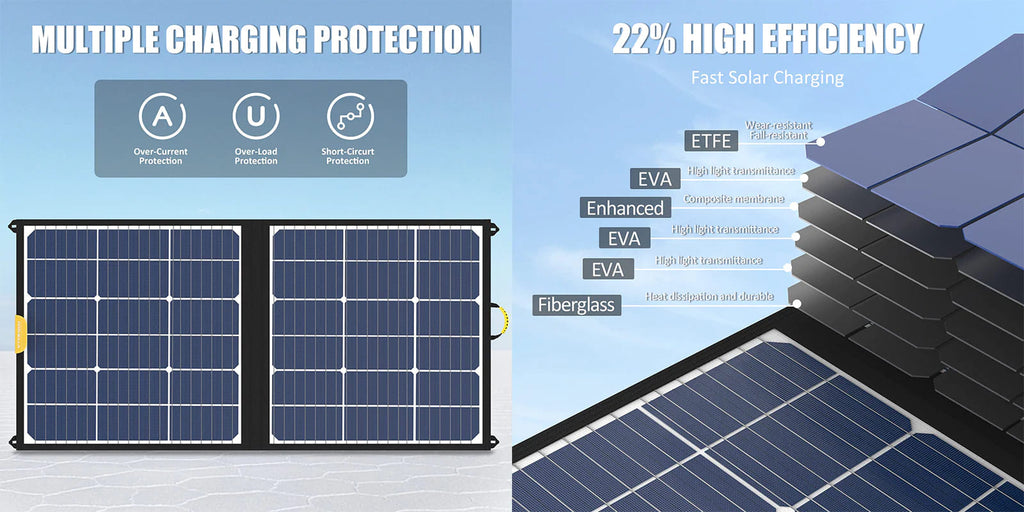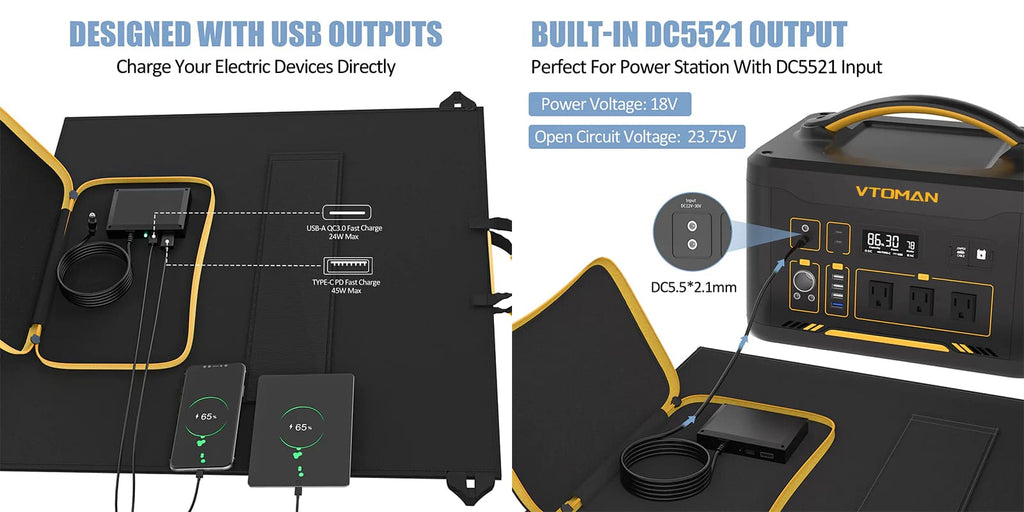The 100W solar panel stands as a pivotal component in the small-scale solar power generation sector, marrying efficiency with affordability. This article delves into the core aspects of a 100W solar panel, offering a comprehensive overview of its capabilities, applications, and how it stacks up against panels of other wattages.
How Efficient Is a 100w solar panel?
The efficiency of a 100W solar panel, typically ranging from 15% to 20%, plays a pivotal role in its power conversion capability. This efficiency indicates that 15-20% of sunlight is transformed into electrical energy, with actual output influenced by factors like material technology, installation conditions, and environmental variables such as sunlight angle and temperature. In optimal conditions, a 100W panel can generate around 300-600 watt-hours per day, though this can vary with changes in weather, geographic location, and the panel's temperature. High temperatures, for instance, can reduce efficiency, underscoring the importance of considering installation environment to maximize energy production.

How Much Power Can a 100 Watt Solar Panel Produce?
A 100W solar panel, under optimal conditions, generates about 100 watts of power per hour. However, actual output hinges on several factors including sunlight intensity, geographic location, and panel orientation. Over a day, it can produce roughly 300-600Wh, assuming 4-6 hours of peak sunlight.
What Size of the Battery Is for a 100W Solar Panel?
To effectively store the energy produced by a 100W solar panel, a battery with a capacity of 40-100Ah is recommended. This size ensures that energy generated throughout the day is adequately stored for later use, balancing between overcharging and underutilization.
How Long Will a 100 Watt Solar Panel Take to Charge a 12V Battery?
Charging time for a 12V battery largely depends on its capacity and the state of discharge. For a 50Ah battery, a 100W panel can take about 5-8 hours to charge from 50% under ideal sunlight conditions. Variables such as weather and battery age can affect this duration.
What Can You Run With a 100W Solar Panel?
| Device | Average Power Consumption | Operational Time | Notes |
|---|---|---|---|
| LED Light Bulb | 5-10W | Can power multiple bulbs simultaneously for several hours | Ideal for lighting needs |
| Laptop | 45-60W | Can support 1-2 hours of operation directly; longer with energy storage | |
| Small LED TV | 20-50W | Can run for 2-4 hours directly; longer with a battery system | |
| Smartphone Charging | 5-10W | Can charge multiple phones throughout the day | |
| Tablet Charging | 10-30W | Can charge multiple tablets, depending on battery size and sunlight availability | |
| Small Fan | 10-25W | Can run for several hours, providing ventilation without taxing the system too heavily | |
| Wi-Fi Router | 5-15W | Can be powered throughout the day, ensuring continuous connectivity | |
| Small Refrigerator | 50-100W | May require energy storage for continuous operation, given their cyclic power needs and higher startup surge | |
| CCTV Security Camera | 5-10W | Can be powered continuously, ensuring security monitoring is maintained | |
| Radio or Stereo System | 20-50W | Can be powered for several hours, perfect for entertainment or information |

Can I Mix Solar Panels of Different Wattages?
Mixing solar panels of different wattages in a single array is possible but requires careful consideration of voltage and current compatibility to ensure optimal performance, and mixing different wattage panels reduces the efficiency and power output. It's generally recommended to use an MPPT charge controller in such setups to maximize energy harvest.
Solar Panels of Different Watts in Comparison
| Wattage | Average Daily Energy Output | Typical Use Cases | Potential Applications |
|---|---|---|---|
| 50W | 200-300Wh | Charging small devices and batteries. | Charging smartphones, cameras, and portable batteries. Small lighting setups. Small DC fans. |
| 100W | 300-600Wh | Running small to medium electronic devices. | Lighting systems. Laptops, smartphones, and small TVs. Small refrigerators (with adequate battery storage). Small pumps and routers. |
| 110W | 440-660Wh | Slightly higher energy needs for personal electronics and small appliances. | Enhanced lighting setups. Charging for multiple devices simultaneously. Small desktop computers. Small water pumping systems. |
| 200W | 800-1200Wh | Supporting significant home appliances or multiple small devices. | LED TVs and medium-sized refrigerators. Multiple laptops and mobile devices. Basic home lighting and small appliances. Small off-grid cabins with basic amenities. |
| 400W | 1600-2400Wh | Powering larger home appliances and more extensive lighting or electronic setups. | Comprehensive home lighting. Desktop computers and gaming setups. Larger refrigerators and washing machines (with adequate energy storage and management). |
| 500W | 2000-3000Wh | Serving more energy-intensive applications in residential settings. | Multiple large appliances simultaneously Home heating solutions. Small air conditioning units. Supporting small workshops with tools. |
| 600W | 2400-3600Wh | Providing substantial power for residential use or small commercial applications. | Full home or small business power needs including heating, cooling, and heavy appliance use. Small irrigation systems. Off-grid setups requiring robust energy solutions. |
Final Words
The 100W solar panel embodies a balance of size, output, and affordability, making it a popular choice for many off-grid applications. Whether for RVs, small cabins, or supplemental home energy, its versatility and efficiency are undeniable. However, understanding the limitations and proper system design is crucial to harness its full potential effectively. As we advance towards greener energy solutions, the 100W solar panel remains a testament to the accessible power of the sun, inviting us to rethink how we generate and consume energy.
Q&As
- 1.How Do Weather Conditions Affect a 100W Solar Panel's Performance?
- Cloudy or overcast skies can reduce the amount of sunlight reaching the panel, thus decreasing its output. Rain and snow can have a similar effect, though they can also help clean the panel, potentially increasing efficiency afterward. Extreme temperatures can affect performance too; high temperatures can reduce the efficiency of solar panels, while very low temperatures can improve it slightly.
- 2.Is a 100W Solar Panel Suitable for Camping or RV Use?
- Yes, a 100W solar panel is highly suitable for camping or RV use due to its compact size and sufficient power output for charging small devices, lighting, and running small appliances. It offers a balance between portability and functionality, making it ideal for off-grid living or travel where electricity access is limited. For extended trips or higher energy needs, multiple panels or higher wattage panels may be considered.
- 3.How Does the Orientation and Angle of Installation Affect a 100W Solar Panel's Efficiency?
- The orientation and angle of installation are critical for maximizing the efficiency of a 100W solar panel. In the Northern Hemisphere, solar panels should face south, and in the Southern Hemisphere, they should face north, to receive the maximum amount of sunlight throughout the day. The optimal angle of tilt varies based on the latitude; a general rule is to set the panel's tilt angle to your latitude to achieve optimal annual energy production. Adjusting the angle seasonally can further enhance efficiency.
- 4.Can a 100 Watt Solar Panel Run a TV?
- Yes, a 100W solar panel can run a small to medium-sized LED TV, typically consuming between 30-60 watts. However, running a TV directly off a solar panel requires a proper setup that includes a battery bank and an inverter to convert DC to AC power.
- 5.Can a 100 Watt Solar Panel Run a Refrigerator?
- Running a refrigerator on a 100W solar panel is challenging due to the high startup power required by most refrigerators. A small, energy-efficient fridge with a low startup current might be supported temporarily, but for consistent operation, a larger system is advisable.
- 6.Can a 100W Solar Panel Power a Heating System?
- A 100W solar panel alone is not typically powerful enough to run heating systems, which require a significant amount of energy. However, it can contribute to a larger solar array designed to power a heating system or be used to power small, low-wattage heating pads or blankets.












